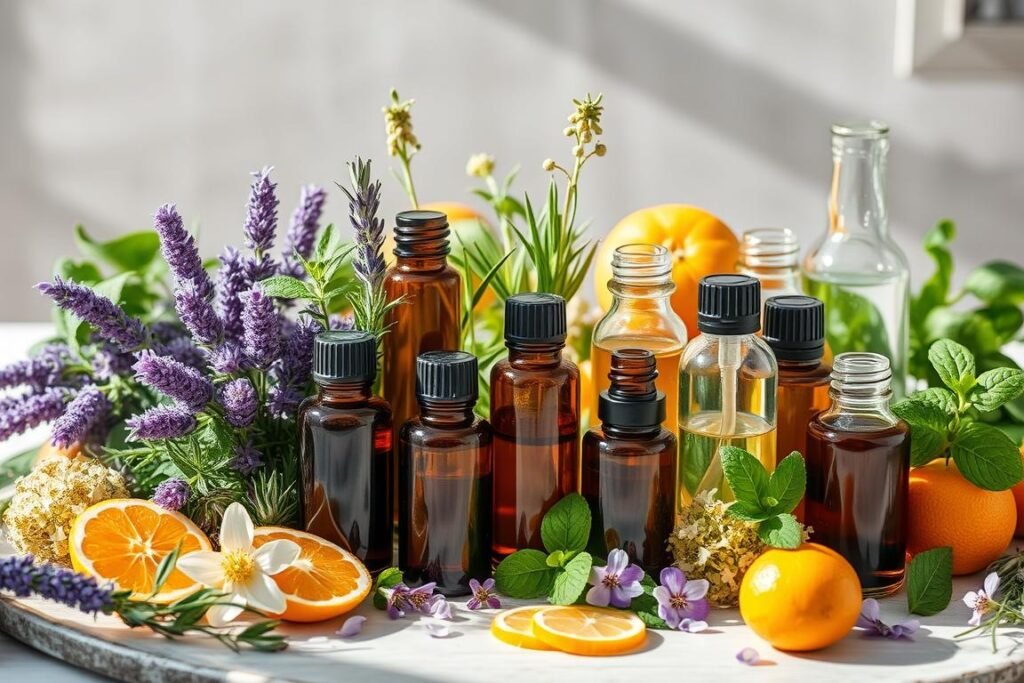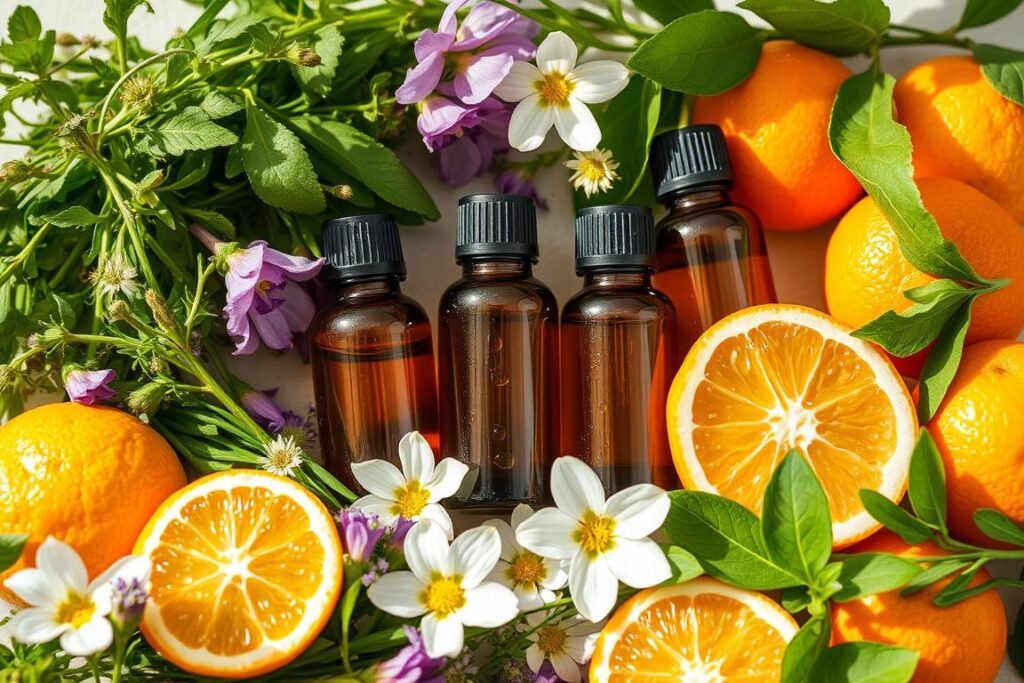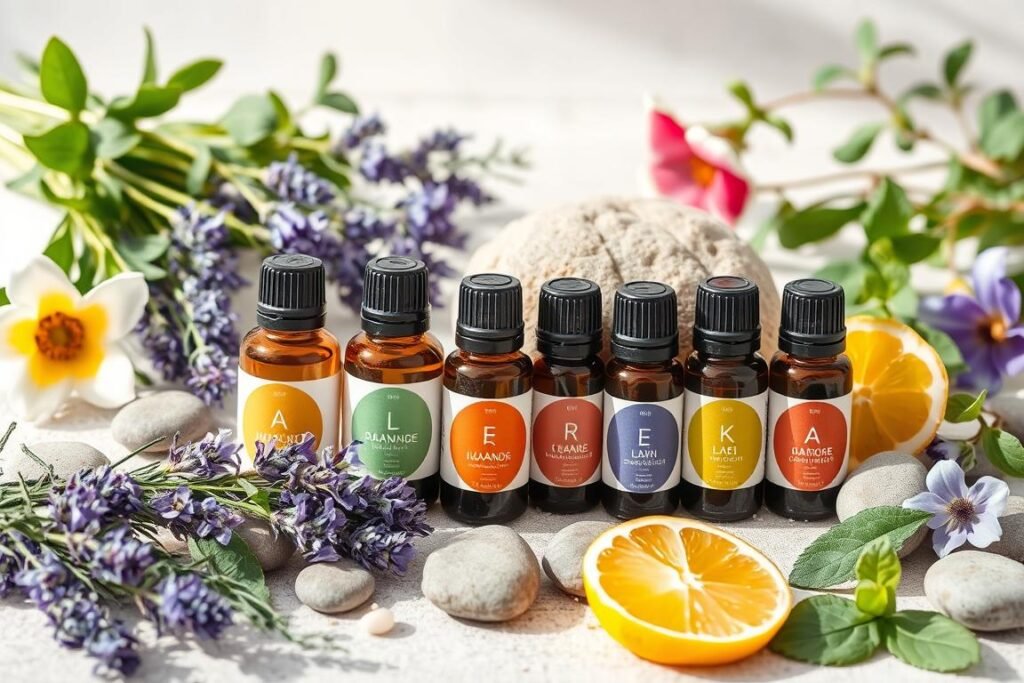Standing in a lavender field, the breeze carried a calming scent. It was then I grasped the power of natural essential oils. These pure extracts from plants have been healing for centuries. They can transform our health, and I’m eager to share this with you.
Key Takeaways
- Natural essential oils are highly concentrated plant extracts with a wide range of therapeutic benefits.
- Aromatherapy, the practice of using essential oils, can impact the emotional center of the brain and help alleviate stress, anxiety, and other mental health concerns.
- Essential oils can also be absorbed through the skin, offering potential benefits in areas like pain relief, inflammation reduction, and antimicrobial properties.
- The quality and purity of essential oils vary greatly, and there is no government regulation or certification system in the U.S.
- Safe usage methods, such as diffusion and dilution with carrier oils, are important to maximize the benefits and minimize any potential risks.
Understanding Natural Essential Oils and Their Origins
The world of natural essential oils is vast, with over 90 types available. Each has unique scents and potential health benefits. These therapeutic oils, extracted from plants, are used in aromatherapy, cosmetics, and food preservation.
How Essential Oils Are Extracted
Extracting essential oils is a delicate process, often using distillation. This turns a plant’s essence into a liquid form. For example, it takes 250 pounds of lavender flowers to make just 1 pound of lavender essential oil.
The Science Behind Plant Extracts
Essential oils contain phytochemicals that benefit both plants and humans. These organic oils and natural fragrances interact with the body in unique ways. They can affect emotions and memory through scent receptors in the brain.
Quality Factors in Essential Oil Production
Quality is key in pure plant essences. Unfortunately, there’s no U.S. government agency that grades or certifies essential oils. When buying, look for labels with the plant’s Latin name, purity info, and origin. Choose dark-colored, glass containers from trusted companies. Be cautious of “fragrance oils” that may contain synthetic chemicals.
| Quality Factor | Importance |
|---|---|
| Geographic Location | Unique climates and soil conditions can affect the composition and quality of essential oils. |
| Distillation Method | The extraction process must be carefully controlled to preserve the purity and therapeutic properties of the oils. |
| Harvest Time | The optimal time to harvest plant materials can significantly impact the essential oil’s quality and composition. |
Knowing how natural essential oils are made is key to enjoying their benefits and therapeutic potential.

Natural Essential Oils: Health Benefits and Applications
The world of volatile oils is full of natural remedies and therapeutic properties. These plant extracts can improve our mood, job performance, sleep, and reduce anxiety and pain.
Essential oils are known for their antibacterial, antifungal, and antiviral powers. Lavender oil, for example, has been used in hospitals for its cleaning abilities.
Research shows that essential oils can fight diseases with their antioxidant properties. Lavender oil can lower anxiety levels, and peppermint oil can help with nausea and vomiting in hospitals.
| Essential Oil | Potential Health Benefits |
|---|---|
| Lavender | Relaxation, improved sleep quality, anxiety reduction |
| Tea Tree | Antimicrobial properties, treatment for fungal infections |
| Peppermint | Focus enhancement, digestive support, nausea relief |
| Eucalyptus | Respiratory health, decongestant effects |
But, not all benefits are proven in human trials. It’s important to use essential oils safely and consider individual skin sensitivity.

“Essential oils have the power to promote a sense of peace, balance, and happiness, leading to emotional and hormonal stability when used mindfully.”
Popular Essential Oils and Their Therapeutic Properties
In the world of natural essential oils, some stand out for their amazing benefits. They help with relaxation, support the lungs, and offer many health benefits. These plant extracts are full of holistic advantages.
Lavender Oil for Relaxation and Sleep
Lavender oil is famous for its calming scent. It’s great for unwinding and improving sleep. Studies show it reduces stress and anxiety and can help with pain.
It also has natural antiseptic properties. This makes it a key part of self-care.
Tea Tree Oil for Antimicrobial Benefits
Tea tree oil is known for fighting off microbes. It’s excellent for skin health, treating acne, and soothing bites. Its scent is fresh and earthy, boosting overall well-being.
Peppermint Oil for Focus and Digestion
Peppermint oil is refreshing and has many uses. Its aroma improves focus and helps with digestion issues like IBS. It also fights fatigue and boosts mood.
Eucalyptus Oil for Respiratory Health
Eucalyptus oil is a natural remedy for colds and flu. Its scent opens airways and eases breathing. It also fights microbes and relieves pain.
These oils are just a few examples of the amazing benefits in aromatherapy and natural remedies. Knowing their unique properties opens a world of well-being. They can be a big part of your daily self-care.
Safe Application Methods and Usage Guidelines
Using pure botanical oils safely is key. Essential oils are very strong. They can deeply affect our minds and bodies if used right.
Aromatherapy is a safe way to enjoy essential oils. By diffusing them in the air, you can breathe in their benefits. This can help you relax, focus, and breathe better. But, be careful with oils like tea tree and eucalyptus. They can be harmful to kids and pets.
When applying essential oils to your skin, mix them with a carrier oil first. Use jojoba, almond, or coconut oil. Aim for a 3-5% mix, which is 3-5 drops of essential oil per teaspoon of carrier oil. Always do a patch test to see if you’re sensitive to it.
Don’t overuse essential oils. Too much can make them less effective. Be extra careful around kids, pets, pregnant women, and people with weak immune systems. Always talk to a doctor before using them, especially if you have health issues or are pregnant.
By following these guidelines, you can use pure botanical oils safely. They can help improve your health and make your home a peaceful place.
Aromatherapy Techniques and Mind-Body Connection
Aromatherapy is a fascinating part of natural medicine. It uses pure plant essences to improve overall health. It works by using the healing powers of natural fragrances and volatile oils to affect both the mind and body.
Diffusion Methods for Maximum Benefits
Diffusion is a key way to enjoy aromatherapy. It spreads tiny oil particles in the air, making it easy to breathe them in. This method is great for lowering stress, improving focus, and making a space feel calm.
Blending Oils for Enhanced Effects
Mixing different essential oils can make their effects stronger. Creating custom blends based on personal needs can greatly improve physical and emotional health. It’s best to use 3-5 drops of essential oils per tablespoon of carrier oil for the best results.
Creating a Therapeutic Environment
When using aromatherapy in a space, it’s important to think about who will be there. For example, older adults with dementia might not smell things as well. By adjusting the environment and methods, everyone can enjoy the benefits of natural fragrances.
The connection between the mind and body in aromatherapy is amazing. When we smell something, it can quickly affect our nervous system. This can lead to emotional changes and can even help reduce stress and anxiety quickly. As we learn more about this ancient practice, the power of natural fragrances keeps growing.
Conclusion
Natural essential oils have a huge potential to help our minds and bodies. They can calm us down or fight off germs. But, we must use them carefully, knowing how they might affect each person differently.
Research is showing that many traditional uses of essential oils are backed by science. Yet, there’s still a lot to learn. I’m excited to see what more research will reveal about their benefits.
Essential oils are a big part of the growing interest in natural health. They offer a natural way to feel better. As I learn more about them, I’m looking forward to seeing their positive effects on our well-being.
FAQ
What are natural essential oils?
How are essential oils extracted?
What are the potential benefits of essential oils?
What are some popular essential oils and their therapeutic properties?
How should essential oils be applied safely?
What are some effective aromatherapy techniques?
Source Links
- https://health.clevelandclinic.org/essential-oils-101-do-they-work-how-do-you-use-them – 11 Essential Oils: Their Benefits and How To Use Them
- https://www.hopkinsmedicine.org/health/wellness-and-prevention/aromatherapy-do-essential-oils-really-work – Aromatherapy: Do Essential Oils Really Work?
- https://www.healthline.com/nutrition/what-are-essential-oils – What Are Essential Oils, and Do They Work?
- https://media.doterra.com/us/en/ebooks/essential-oils-origins.pdf – PDF
- https://www.newdirectionsaromatics.com/blog/articles/essential-oil-purity-truths-facts-and-misconceptions.html – ESSENTIAL OIL PURITY: TRUTHS, FACTS, AND MISCONCEPTIONS
- https://www.webmd.com/diet/health-benefits-essential-oils – Health Benefits of Essential Oils
- https://www.newdirectionsaromatics.com/blog/essential-oils-uses-and-benefits/ – ESSENTIAL OILS USES AND BENEFITS
- https://www.everydayhealth.com/wellness/potential-health-benefits-of-essential-oils/ – Essential Oils: 7 Possible Health Benefits
- https://www.newdirectionsaromatics.com/blog/categories-of-essential-oils-their-benefits/ – CATEGORIES OF ESSENTIAL OILS & THEIR BENEFITS
- https://www.performancehealth.com/articles/essential-oils-benefits-and-uses-chart?srsltid=AfmBOorfKBz72WRqBove8CFEDalEXvnHqKqMgeOtTdYJZutKw2d3tkgm – Essential Oils Benefits and Uses Chart
- https://www.healthline.com/health/are-essential-oils-safe – Are Essential Oils Safe? 13 Things to Know Before Use
- https://sparoom.com/blogs/blog/essential-oils-uses?srsltid=AfmBOoq3jHblpug0eclCQs7CrRZDNmguhXGu2HsTzyqgMpzAsIKHUAww – Essential Oils Guide: Applications, Benefits and Safety Tips
- https://essentialthree.com/start-here/safe-use-of-essential-oils/ – Safety Guidlines – Essential 3
- https://www.medicalnewstoday.com/articles/10884 – Aromatherapy: Uses, benefits, oils, and risks
- https://www.moriahbehavioralhealth.com/aromatherapy-for-mental-health-support/ – Aromatherapy for Mental Health Support – Moriah Behavioral Health
- https://pmc.ncbi.nlm.nih.gov/articles/PMC10905622/ – Essential oils: a systematic review on revolutionizing health, nutrition, and omics for optimal well-being
- https://www.niehs.nih.gov/health/topics/agents/essential-oils – Essential Oils
- https://www.jeeng.net/pdf-177404-98686?filename=Properties and.pdf – PDF


